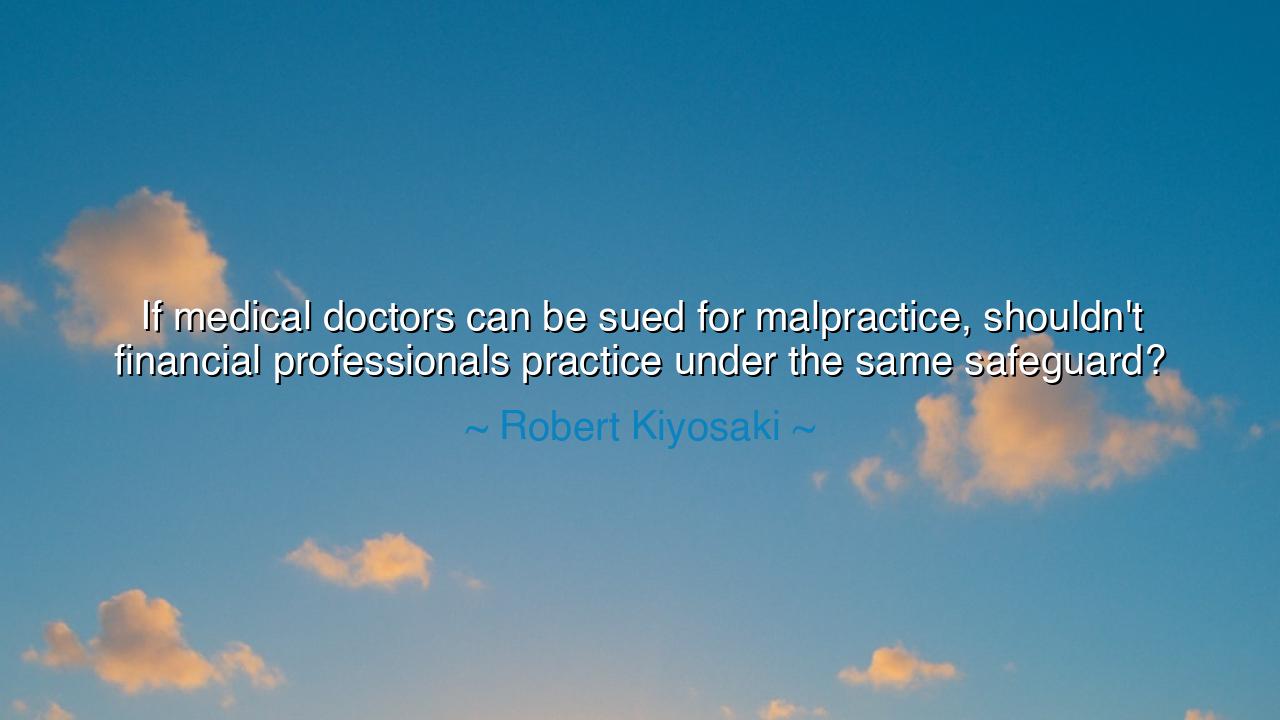
If medical doctors can be sued for malpractice, shouldn't
If medical doctors can be sued for malpractice, shouldn't financial professionals practice under the same safeguard?






When Robert Kiyosaki asked, “If medical doctors can be sued for malpractice, shouldn’t financial professionals practice under the same safeguard?” he was not merely posing a question — he was issuing a challenge, a moral reckoning to a world that entrusts lives to healers of the body but wealth to healers of destiny. His words pierce through the veil of modern commerce and reveal a deep truth: that money, like medicine, holds the power to sustain or destroy, to heal or to wound. In his question lies a timeless wisdom — that those who wield power over the well-being of others must bear the burden of accountability. For wealth, when mismanaged, can cripple the future just as surely as disease afflicts the flesh.
To understand Kiyosaki’s meaning, one must see beyond the literal and into the moral heart of his comparison. A doctor may harm the body through neglect or error, but a financial advisor, by poor guidance or greed, may harm the spirit, the family, and the generations that follow. Both deal in the currency of human trust. Yet society has long protected one and excused the other, as though the injury done by reckless counsel is any less grave than the wound of a surgeon’s blade. Kiyosaki’s question is not of law, but of ethics — of fairness and integrity. If the physician must swear an oath to “do no harm,” why should not those who guide the financial health of others swear the same?
The origin of this insight flows from Kiyosaki’s lifelong study of wealth and education. As a teacher of financial literacy, he has seen how many fall victim to false prophets of prosperity — advisors who profit from their clients’ ignorance, institutions that reward speculation over stewardship. He knows that the wounds inflicted by financial malpractice — lost homes, broken retirements, squandered dreams — leave scars that no medicine can heal. His words therefore arise from experience, not cynicism. Like the philosophers of old, he calls for a return to virtue in vocation, a recognition that wisdom without honor is corruption, and that all who guide others must be bound by the same moral laws that govern the healers and the just.
History offers many mirrors for Kiyosaki’s wisdom. Consider the story of the Panic of 1929, when careless speculation and deceitful practices brought nations to their knees. Millions lost everything — not because of fate, but because of the greed of a few who treated finance as a game, not a sacred duty. In the aftermath, new laws arose to govern the markets, but even those could not fully restore what had been taken: trust. It is trust, above all, that binds patient to doctor, citizen to leader, and investor to advisor. When that trust is betrayed, it is not merely wealth that dies — it is faith in the system itself. Thus, Kiyosaki’s call for accountability is not a demand for punishment, but for the restoration of trust, for a renewal of honor among those who shape the fortunes of others.
The ancients, too, understood this truth. In Aristotle’s Ethics, the philosopher taught that virtue in any craft is measured not by the power to act, but by the responsibility to act rightly. The healer, the builder, the merchant — all were judged by whether they pursued excellence for the good of others, not merely for gain. The same principle guided the wise in every age: that those entrusted with the welfare of others must hold themselves to a higher standard. In this, Kiyosaki’s question becomes timeless — a reminder that progress without morality is peril, and that the modern world, rich in tools but poor in virtue, must relearn the old ways of duty and honor.
But there is another layer to his message — one not of accusation, but of empowerment. Kiyosaki teaches that individuals, too, must become stewards of their own financial well-being. Just as one must not entrust one’s body blindly to a physician without understanding its care, so too must one not surrender one’s wealth to the counsel of others without wisdom. Knowledge is the truest safeguard against malpractice. When citizens are financially literate, they cannot be so easily misled. Thus, Kiyosaki’s question is both an indictment and a call to action: let those who lead in finance be bound by ethics, and let those who follow be guided by understanding.
The lesson, then, is this: responsibility and knowledge are the twin pillars of a just society. If we hold our doctors to account for the health of our bodies, we must hold our financial guides to account for the health of our futures. But we must also become participants in our own healing — of body, of wealth, of spirit. Do not follow blindly, but learn deeply. Do not seek profit without purpose, nor success without service. For in the end, as the ancients taught, a civilization stands not by its riches, but by the righteousness with which those riches are earned and guarded.
And so, let this wisdom be remembered: wealth and medicine alike are forms of care. Both demand precision, compassion, and integrity. When governed by greed, they destroy; when practiced with virtue, they uplift nations. As Kiyosaki reminds us, the measure of a professional — be he doctor or financier — is not in the profits he earns, but in the lives he protects and the trust he preserves. Let every person, then, whether healer, teacher, or steward, live by one sacred oath: to use their power not for gain alone, but for the betterment of humankind.






AAdministratorAdministrator
Welcome, honored guests. Please leave a comment, we will respond soon